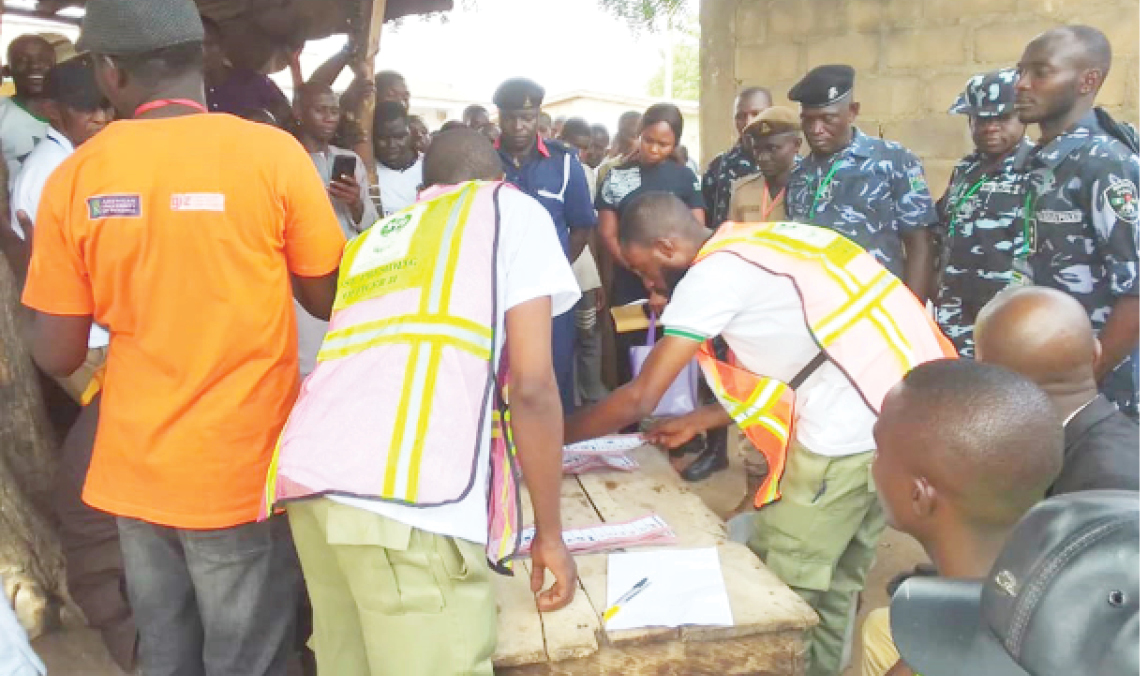By Olukayode Adebambo
The hornet’s nest around discussions on the outcomes of Nigeria’s 2023 general elections comprising the presidential, National Assembly, governorship and state houses of assembly appeared to have been stirred once more with the recent release of the final report on the findings by one of the foreign elections observer missions, the European Union Election Observation Mission (EU-EOM), on the February 25 and March 18 elections.
The EU-EOM, which worked for three months in Nigeria, between January 11 and April 11, 2023, had a total of 110 accredited observers from 25 EU member states, as well as Norway, Switzerland, and Canada.
According to the Chief Observer of the Mission and member of the European Parliament, Barry Andrews, the Mission was pleased to present its findings and recommendations after a three-month-long observation across Nigeria.
The report, which he said was in accordance with the EU-EOM’s usual practice, noted that shortcomings in law and electoral administration hindered the conduct of well-run and inclusive elections and damaged trust in the Independent National Electoral Commission.
- Yul: Rita Edochie prays for actor’s home amid divorce rumour
- Top 3 Best Music Education Programs in 2023 (Most Popular)
Following the outcome of the elections, particularly the presidential election, and the INEC’s eventual declaration of the then candidate of the ruling All Progressives Congress, APC, Bola Ahmed Tinubu, as the winner, tongues have been wagging and discussions have continued around the process.
The two major opposition parties- the Peoples Democratic Party, PDP, the Labour Party, LP, and their presidential candidates, Alhaji Atiku Abubakar and Peter Obi, respectively, as well as about three other political parties, disagreed with the outcome of the elections and have since gone to the Presidential Elections Petitions Tribunal to challenge it.
INEC has continued to face questions over logistical shortcomings and technology failures, notably challenges with the Bimodal Voter Accreditation System (BVAS) and the limited functionality of the INEC results viewing portal (IReV). IReV was supposed to improve transparency by displaying digital copies of result sheets from all the nearly 180,000 polling units once they were signed.
However, despite these shortcomings, the election was arguably one of the best in the Fourth Republic, producing the most diverse in party representation since 1999. Five political parties produced state governors, seven parties won senatorial seats while eight are represented in the House of Representatives and nine in State Houses of Assembly.
In some states around the country, different political parties control the legislative and executive arms of Government, indicating that the days of single party dominance of our national politics are probably gone.
The election was one of the most meticulously prepared for in recent times when compared to some previous elections.
As attested to by INEC Chairman, Prof. Mahmood Yakubu, this meticulous preparation ensured the poll was not derailed by the security challenge in the country.
“Among the positive stories is that the security challenge which threatened to derail the elections did not materialise. Concerns that the polls will be disrupted by the perennial insecurity across the country fizzled out on Election Day as the elections were largely peaceful.
“Despite currency and fuel challenges and widespread attacks on our personnel and facilities nationwide, the Commission proceeded with the election as scheduled,’’ he said.
Yakubu said that the first set of elections, the Presidential and National Assembly, held as planned for the first time in the last four general elections conducted in the country. He added that accreditation of voters using the Bimodal Voter Accreditation System (BVAS) had generally been scored very high by voters.
“Our records show that the success rate for BVAS accreditation stands at 98 per cent compared to the Smart Card Reader’s 29.2 per cent during the 2019 general election. Above all, despite the divergent opinions about the outcome of the election, the overall outlook suggests that it is a fair reflection of a complex multi-party democracy,’’ Yakubu said.
So many international and local election observers commended the conduct of the poll.
The Police Chaplains Electoral Observation Mission in Nigeria, and eight Domestic Observers that monitored the Presidential and National Assembly elections described the poll as a sign of the country’s political maturity.
The mission, which is the arm of the International Police Chaplain Sustainable Development and Law Enforcement (IPCSL) Inc., USA, said this in their preliminary report in Abuja.
Other groups are the Grassroots Empowerment Initiative for Positive Change and Development, Voters Awareness Initiative, Society for the Protection of Human Rights and African Civil Society Forum.
They also include Africa Youths International Development Foundation, Pan African Leadership League, Centre for Strategic Conflicts Management, and Youth and Public Safety Awareness Initiative, which monitored the election across the country.
Presenting the preliminary report on the election, the Head of IPCSL Mission, Col. Johaness Makouvia, described the exercise as peaceful, stressing that the process conformed with the international standard, and that the discreet presence of the security forces in most of the polling centres allowed for the peaceful conduct of the voting process.
“Overall turnout was orderly and calm, and voters cast their ballots peacefully without major incidents,” he said.
The Muslim Rights Concern (MURIC) faulted the final report of the European Union observer team on Nigeria’s 2023 general election, describing it as an imperialist agenda.
Prof. Ishaq Akintola, Executive Director, MURIC said this in a statement on Tuesday in Abuja.
“The EU EOM final report is the odd one out when juxtaposed with those of other election monitoring groups. We saw nothing close to this in the report of the US-based International Republican Institute (IRI) and the National Democratic Institute (NDI),” he said
Olukayode, a public affairs analyst, writes from Ibadan

 Join Daily Trust WhatsApp Community For Quick Access To News and Happenings Around You.
Join Daily Trust WhatsApp Community For Quick Access To News and Happenings Around You.


